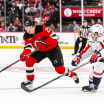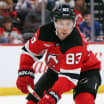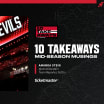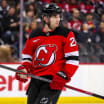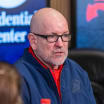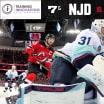Despite the enormity of the accomplishment and his massive role in it, Mark Johnson's perspective on the Miracle on Ice rather simple.
"All this all took place in a little town in upstate New York. But I also have grey hair now so I guess it's not so hard to believe it has been 40 years," said Johnson, when asked about the 40 years that have passed since the U.S. men's hockey team beat the Soviet Union and later won the gold medal at the Winter Olympics in Lake Placid, N.Y.
Johnson, 62, came to the Devils eight seasons after helping the Americans win gold. He, along with forward Neal Broten and Jack O'Callahan, is one of three former U.S. Olympians to play for the Devils. Head coach Herb Brooks, the man who masterfully crafted that gold medal winning squad, was Devils head coach for a season in 1992-93 and in Utica n 1991-92.
Johnson is the son of legendary U.S. hockey figure "Badger" Bob Johnson and Mark is the long-serving head coach of the women's hockey program at the University of Wisconsin (Madison). Before playing on the U.S. Olympic team, Johnson played for his father in Madison, winning a national championship in 1977.
FEATURE: Miracle Johnson
On the 40th anniversary of Team USA's Olympic triumph over the Soviet Union, we chatted with former Devils forward Mark Johnson
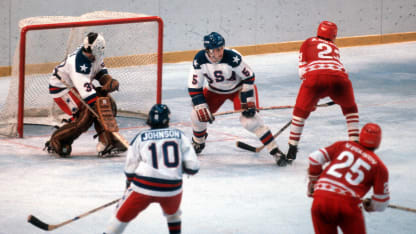
Bob Johnson served as the previous U.S. Olympic coach in 1976 in Innsbruck. Mark Johnson's Olympic journey had begun that season until "my dad cut me over Sunday dinner."
"He was the Olympic coach and his (18-year-old) son was playing for him," said Johnson, "given the (dynamic) in college hockey, I probably could have (made the team), but…" leaving the potential appearance of conflict unstated.
Johnson was the team's MVP in Lake Placid, scoring twice in the gold medal game and was generally regarded as its best player. It's difficult to distill Johnson's contribution down to a few events but his first goal against the Soviets as time was expiring in the first period that tied the game at two stands out.
"I looked up and saw the clock tick down from one to zero, so I knew it was going to count," said Johnson.
He was also on the ice as the clock ticked down in the third as the Americans were feverishly holding off the Soviets desperate attempts to tie the game.
"It had been like that from about 10 minutes left," said Johnson, in reference to captain Mike Eruzione's goal that proved to be the winner. "The Soviets had always been a possession team but (at that point) they started to dump the puck in our end, and it changed (the dynamic) of the rest of the game…we held on."
Time gives a perspective that is not obvious as events unfold. Of course, the American victory was an enormous upset. A miracle, as the call by broadcaster Al Michaels later grew into mythical proportions that is now familiar to even non-hockey fans.
But does the Miracle on Ice moniker obscure just how bloody talented a bunch of American college kids really were? The Soviets, fresh off a win over a team of mostly Canadian NHL stars in the Challenge Series a year earlier, and 18 months prior to beating the Canadians at the 1981 Canada Cup, were a juggernaut.
They weren't toppled on pixie dust alone.
Johnson agreed that the talent of his team tends to get overlooked, to a point.
"When you look at our team, we were (mostly) from the three previous national championship teams in college hockey," said Johnson, in reference to his own Wisconsin squad in 1977, then Boston University the following season, and Brooks's Minnesota Gophers in 1979. "Many guys played in the NHL and others had a coffee and a donut before getting on with the rest of their lives."
To Johnson's point, defenseman Ken Morrow (a rare non-Badger, Gopher, Terrier on the squad), stepped right into the New York Islanders dynasty from Lake Placid. Johnson went directly to Pittsburgh to play for the Penguins. He never played a game in the minors.
"We had Jim Craig in goal, who played as well as any goalie has in the Olympics," said Johnson. "Our defense too, Ken, Dave Christian, who was a forward playing defense, Rammer (Mike Ramsay), who played for 17-18 years in the NHL, and Bill Baker (who later played for Montreal and Colorado)…Neal Broten and I had good careers, and a guy like Mark Pavelich with the Rangers."
The cavaet, though, according to Johnson, is that the Americans' talent and Brooks brilliance in guiding them took place in the unforgiving Olympic format.
"In one game, anything can happen and it did for us," said Johnson, "I wouldn't have wanted to play (the Soviets) in a seven-game series."
Other factors and simple facts surrounding the victory also tend to get ignored and misrepresented.
One critical element to the victory over the Soviets was that it was not a semi-final, nor was the Finland game that followed two days later a gold medal game in the truest sense. The Olympic format in 1980 was a double round-robin. That meant that the U.S. had to come back and play Finland no matter what result had transpired against the Soviets, who still had to play Sweden.
Back then, points against other medal-round nations carried forward, so the Americans brought with them just a single point from its preliminary round tie with Sweden (then gained two for beating the Soviets). A loss to Finland would have left them with just three points and the possibility of still finishing fourth and off the podium.
It all meant that the Americans had to keep their focus against a Finnish squad that had overcame a tough Canadian team that boasted a bunch of future NHLers just to qualify for the medal round.
"I still remember Herb the next day at practice (drilling) that in," says Johnson, "look, are you going to let something slip by that you'll regret for the rest of your life?"
"That was (especially true), when we were down 2-1 after the second period."
The Americans, of course, eventually beat Finland 4-2. Johnson assisted on the winning goal and iced the victory with a short-handed marker with a few minutes left.
In his 669-game NHL career, Johnson played for Pittsburgh, Minnesota, Hartford, where he served as captain, St. Louis and then the Devils, a five-season stretch highlighted by a conference final run in 1988.
"New Jersey was great for me," remembers Johnson, "The playoffs in 1988, Sean Burke coming back from the Olympics and we went on that run just to get into the playoffs…losing to Boston in Game 7 (of the Conference Final). I'm not sure we could have beaten Edmonton that year but I think we could have taken a game or two (compared to the Bruins being swept)."
Johnson scored 10 goals and had eight assists in 18 playoff games.
Johnson had a front-row seat for the infamous Game 4 against the Bruins when replacement officials were used after referee Don Koharski landed in the verbal crosshairs of Devils head coach Jim Schoenfeld after Game 3.
The officials for Game 4 refused to take the ice.
"Schoenny…," laughs Johnson, off the donut caper, adding that even the players were in disbelief how events unfolded as amateur refs were found so the game could be played.
Just as memorable was the old-time hockey motivation tactics employed Lamoriello to get his club to the playoffs.
"We stayed in a hotel even for home games for the last three weeks of the season so we could focus," says Johnson, "I was playing on a line with Johnny MacLean and Patrik Sundstrom. (MacLean) scored the winning goal in overtime to make the playoffs.
"We celebrated like we won the Stanley Cup."



